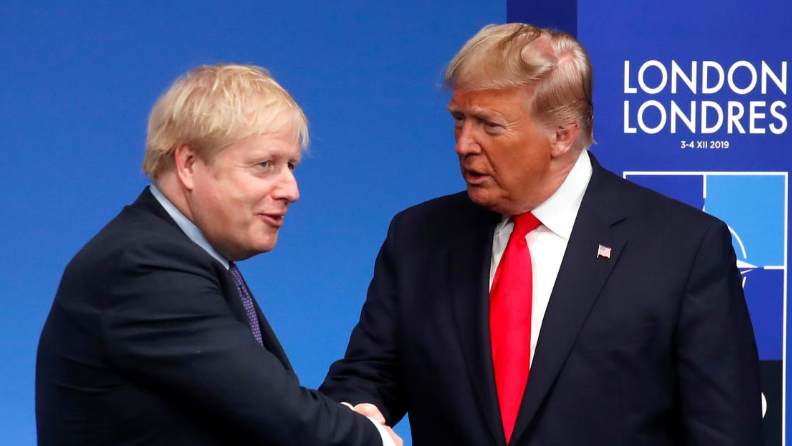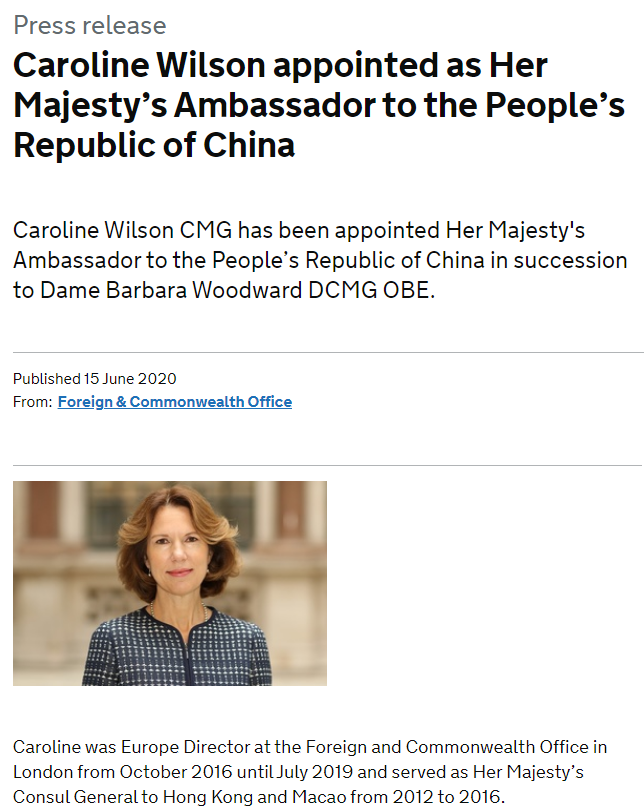
Britain's Prime Minister Boris Johnson shakes hands with U.S. President Donald Trump during a welcoming ceremony at the NATO leaders summit in Watford, Britain, December 4, 2019. /Reuters
Britain's Prime Minister Boris Johnson shakes hands with U.S. President Donald Trump during a welcoming ceremony at the NATO leaders summit in Watford, Britain, December 4, 2019. /Reuters
Editor's note: Freddie Reidy is a freelance writer based in London. He studied history and history of art at the University of Kent, Canterbury, specializing in Russian history and international politics. The article reflects the author's opinions, and not necessarily the views of CGTN.
The UK's decision on whether to permit Huawei to bid for 5G infrastructure contracts had all the "Will they? Won't they?" twists and turns more akin to a Korean drama than that of a policy decision.
The move marked a low point in recent Sino-British relations and a test of where the UK sees its post-Brexit future. It was not a decision entered into lightly, so, as Donald Trump ratchets up the tension with sanctions on individuals such as the Hong Kong chief executive as well as technology firms ByteDance and Tencent, will Boris Johnson follow suit?
There is little doubt that there has been a cooling in relations between Beijing and London. It is important to understand though, that while the U.S. and UK continue to reaffirm their "special relationship", the issues surrounding each nation's relationship with China are different.
Presently, the China hawks in Britain are increasing their influence. UK members of parliament such as Tom Tugendhat, chairman of the influential Foreign Affairs Select Committee, have become ever more vocal with concerns over the UK's relationship with China.
What has exacerbated this low point in relations is a confluence of two separate issues, with both concerned bodies able to coordinate a combined response. On the one hand is the issue of Huawei's bid to build the UK's 5G infrastructure. This is a security concern and is more closely aligned to the U.S. position. The second issue has to do with Hong Kong SAR.
In UK politicians' eyes, the Hong Kong issue with them is different to that of the Americans' position. For London, there is a "sense of duty" to uphold the joint declaration between China and the UK. It is unavoidable that interpretations of the agreement will be viewed differently between the two nations and will lead to tensions from time to time.
The U.S. takes a more holistic approach to Hong Kong and the implementation of the national security law. Donald Trump is keen to amalgamate issues of national security, a trade war, COVID-19 and China's domestic agenda into one single issue - China, and to weaponize it for political capital.
This is where Boris Johnson's government is likely to diverge. The UK has long seen itself as a bridge between East and West and has been willing to engage with both parties, sometimes in defiance of the other. Boris Johnson is a proponent of the Belt and Road Initiative, Trump is not. The UK is a founding member of the Chinese-led Asian Infrastructure Investment Bank, again in defiance of the United States.
The United Kingdom will, as it has before, approach the challenges it sees on the international stage through diplomatic channels, whereas the U.S. president is likely to continue with a maximum-pressure agenda backed by economic sanctions and a lingering threat of military saber rattling.
It is the case though, that the UK government is continuing to negotiate a trade deal with the U.S., one which will likely carry many caveats on how the UK interacts with China. To the more internationalist and freer trading MPs in the government, there is a feeling that the UK did not leave the European Union to become a 51st state of America.
An indication that this is not the desire of the prime minister can be found in his choice of ambassador to Beijing, Caroline Wilson, who is due to be installed in September.

Screenshot on the UK Foreign and Commonwealth Office's press release on the new Ambassador to China, published on June 15, 2020.
Screenshot on the UK Foreign and Commonwealth Office's press release on the new Ambassador to China, published on June 15, 2020.
Wilson, who served as Consul-General to Hong Kong and Macao SARs between 2012 and 2016 has been clear in her position on Hong Kong, "Hong Kong's place is firmly within the People's Republic of China under the 'One Country, Two Systems' framework, which has on the whole worked incredibly well in the 20 years since the handover."
Wilson is also regarded as an internationalist, favoring collaboration and growth over a protectionist agenda, a noted point of difference from the U.S. approach. Caroline Wilson's experience as Europe director at the Foreign Office during Brexit also gave her valuable experience in understanding a nation's domestic agenda concerns when approaching international policy.
Boris Johnson's view has always been of a global and open Britain. Where the Trump administration is concerned with the protection of U.S. interests at home, Johnson believes that the key to that same protection, lies with the UK at the heart of a connected network of nations, where trade and ideas can flow freely.
It is not possible for this vision to ever be truly be realized without the presence of the Britain's long-term partner in the East. It is therefore likely that we can expect the UK and China to continue to strengthen their bonds of friendship, free from much of the rhetoric and tit-for-tat sanctions and diplomatic expulsions, which presently mar Beijing's relationship with Washington.
(If you want to contribute and have specific expertise, please contact us at opinions@cgtn.com.)